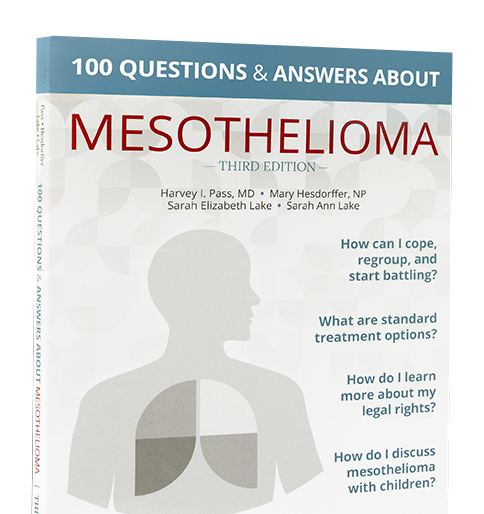After receiving a mesothelioma diagnosis, many patients want to know “How long can I live with mesothelioma?” An outline of the patient’s chances of recovery, known as a prognosis, can only be determined by a doctor who can use mesothelioma survival statistics, combined with factors unique to each patient to arrive at a prognosis.
The survival statistics used in a prognosis determination are based on the five year survival rate for mesothelioma patients. This five year survival rate reflects the number of patients who survive with mesothelioma for at least five years after the time they are diagnosed. A doctor familiar with your case will combine these statistics with a patient’s cancer stage, type of mesothelioma, age and overall health to arrive at a prognosis that is unique to every individual.
The mesothelioma community is continually working to find new, effective treatments to improve the life expectancy of mesothelioma victims. While the prognosis for mesothelioma sufferers is still poor, and there are prognosis factors that you cannot change, there are steps that you can take that may improve mesothelioma survival rates.
Early Diagnosis
Perhaps the most critical step in improving a patient’s mesothelioma survival rate is to catch the cancer at one of the earliest stages when the most treatment options available.
Mesothelioma often takes 10 to 60 years to develop and present symptoms after asbestos exposure. These symptoms are often similar to common ailments, making misdiagnosis common. Many times the mesothelioma has already reached an advanced stage before treatment is sought or a correct diagnosis is made.
Anyone who has been exposed to asbestos at any point in their lives should speak with their family doctor to schedule regular screenings for asbestos-related illnesses. Researchers are continuously working on new methods of diagnosing mesothelioma as early as possible including blood tests and imaging.
Finding a Mesothelioma Specialist
After receiving a mesothelioma diagnosis, seeking out an oncologist or medical team who specializes in the treatment of mesothelioma as soon as possible is in the patient’s best interest. Because there are so few cases of mesothelioma, it is important to work with a doctor who has knowledge of the most up-to-date methods of treating mesothelioma cancer.
The information presented here is not intended to endorse any particular form of treatment. Working with a mesothelioma specialist, you can develop a plan to begin taking steps towards improving your life expectancy.
Treatment
Receiving treatment as soon as possible may extend a patient’s survival time. The best course of treatment will be recommended by the oncologist based on each patient’s unique case, but will often include surgery, chemotherapy, radiation, or some combination of these options.
Chemotherapy is often times the first approach to treating mesothelioma as it can used to shrink tumors or as a palliative treatment. A combination of chemotherapy drugs may be used to slow quick dividing cancer cells.
Various surgical procedures can be used to remove cancerous tissue in early stage mesothelioma, but is unfortunately not an option for mesothelioma that is diagnosed in the late stages. These surgical procedures often provide the most hope for cancer remission.
The third commonly used treatment for mesothelioma, radiation, is often used as a palliative treatment and is not used for the treatment of peritoneal mesothelioma. Radiation is most often combined with chemotherapy or a surgical option.
Current studies show the highest rate of survival in patients who are candidates for surgery or a multimodal treatment plan consisting of surgery, chemotherapy, and radiation.
If you wish to learn more about mesothelioma, CLICK HERE to receive a free book written by medical professionals who have treated mesothelioma.
Clinical Trials
Clinical trials can offer mesothelioma patients the chance to take advantage of experimental treatments that may result in an increased life expectancy.
Before new, promising treatments can be made available to the general public, doctors conduct clinical trials to test whether a new treatment can safely and successfully fight mesothelioma. Because these trials are experimental, there are risks to weigh with the benefits of participation, but many mesothelioma success stories can be attributed to patients receiving the most cutting-edge treatments through a clinical trial. If you are interested in learning more about clinical trials, you should discuss your options with your doctor or CLICK HERE to speak with a mesothelioma specialist.
Overall Health
Overall Health, which is often referred to as performance status, is one of the few factors used in a mesothelioma prognosis that a patient may be able to influence.
Studies have shown that a patient’s general fitness and activity level can have an important effect on mesothelioma survival rates. Lifestyle changes such as increased activity and a healthy diet can improve your quality of life and strengthen your immune system, allowing your body to stand up to and recover from aggressive mesothelioma treatments.
Complementary & Alternative Therapies
Many doctors may recommend that patients combine their conventional treatments with complementary and alternative medicines. These methods for mesothelioma patients can include nutrition and dietary changes, supplements, massage, meditation, and yoga.
When used safely, complementary and alternative treatments, while not generally curative, can improve a patient’s quality of life and immune system which may lead to an increased survival rate. It is important to discuss any treatment you may be considering with your mesothelioma physician for guidance.
If you wish to learn more about mesothelioma, complete the form above or CLICK HERE to receive a free book written by medical professionals who have treated mesothelioma.






